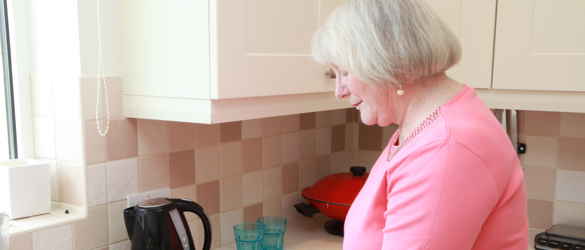
Help with benefits
Depending on your circumstances, you may be entitled to financial support from the government. Welfare benefits are available to help those living with macular disease, and their families, with extra costs.
Disability benefits
There are disability benefits available to cover the extra costs of living with a long-term illness or disability, like macular disease. These benefits are dependent on your age and whether you meet the criteria to receive the benefits. If you meet the criteria, you will be awarded the benefit regardless of any other income - for example, your salary from your job or pension payments. You may even be entitled to further support from the government.
What is my pension age?
State Pension age for men and women has now aligned and is increasing. To find out when your pension age is, and therefore which benefits you may be entitled to, you can use the free government pension age calculator at gov.uk
Attendance Allowance
If you are of pension age and are living with a long-term illness or disability you may have additional costs such as gardeners, taxi fares and cleaners. Attendance Allowance (AA) is a benefit awarded to people over pension age to help pay for these additional costs. AA is awarded at two rates, low and high. A claim for AA is made by completing a form and providing additional evidence, which could include letters from your GP, other doctors and friends and family. An award is made based on the information that you provide and there is no face-to-face medical assessment carried out as part of the application.
Want to find out more about Attendance Allowance and how to apply?
Visit our Attendance Allowance webpage.
Disability Living Allowance (DLA)
Disability Living Allowance (DLA) is paid to children over the age of three and up until their 16th birthday. DLA is split into mobility and care, and has different rates. Mobility is awarded at either low or high rates, and care at low, middle or high. The child is awarded either mobility or care, or both, at varying rates depending on how the child meets the criteria.
The Department for Work and Pensions award DLA to a child based on their completed DLA form and from additional evidence included with the application.
The decision to award is based on all aspects of the child’s life. This ranges from their physical and learning abilities, both at home and school, and other activities. The child’s development is compared with where a child of a comparable age would be in order to inform the decision.
DLA is no longer awarded to adults. This benefit was replaced by Personal Independence Payment (PIP) in June 2013. For more information about these changes visit our DLA for adults webpage.
Want to find out more about Disability Living Allowance for children and adults?
Visit our Disability Living Allowance for children or Disability Living Allowance for adults webpage.
Personal Independent Payment (PIP)
Personal Independence Payment (PIP) is a disability benefit paid to people over the age of 16 but under pension age. The benefit is paid in two parts: mobility and daily living. Both of these are paid at either standard or an enhanced rate. The benefit can be for mobility or daily living at either level, or a combination of both.
To claim PIP the applicant completes a form and has a face-to-face assessment with an independent medical professional. This process establishes whether the applicant meets the criteria to receive an award of PIP.
Want to find out more about Personal Independence Payment?
Watch our PIP videos or see our Personal Independence Payment webpage.
Carer's Allowance
Your carer can only receive this benefit if you receive:
- The Daily Living component of PIP
- Attendance Allowance at either rate
- DLA Care component at either middle or high rate
- 35 hours a week of care
The person applying for Carer's Allowance will only receive the payment if they earn under £139 per week after tax, National Insurance and expenses. If they earn over this they will receive no benefit; Carer's Allowance has a direct impact on other benefits you might be entitled to.
It is essential that you seek specialist advice before claiming this benefit to ensure it will not have an impact on your income.
Work Capability Assessment (WCA)
If you have a long term illness or disability you may feel that you are unable to work, therefore you would make a claim for the 'new style' Employment and Support Allowance for Universal Credit through ill health. As part of your claim you will be expected to complete the Work Capability Assessment (WCA).
The WCA is made up of two parts, completion of the work capability assessment form and an assessment carried out by an external medical practitioner. This assessment will determine your capability for work and the additional support that Job Centre Plus will offer.
Want to find out more about Work Capability Assessment?
Visit our Work Capability Assessment webpage.
Other welfare benefits
The UK government can offer financial support to families for day-to-day expenses depending on your circumstances. Family circumstances could include:
- You care for somebody in your household so you are unable to work
- You are a parent and looking after young children
- You are out of work
- You are unable to work due to a disability or illness
Depending on your circumstances, Job Centre Plus will determine what benefits you are entitled to. This is based on how much the government states you need to live on. These considerations are:
- If you are married or living as a couple
- If you are a single person
- If you are a single parent
- If you are a disabled person
There is plenty of information available about the benefits that you are entitled to online. Use the free benefits calculator on gov.uk Some of the benefits you may be entitled to are:
- Universal Credit - which includes child tax credits, housing payments and personal allowances
- 'New style' Employment and Support Allowance – which is an allowance paid if you are unable to work due to ill health or a disability
- Child Benefit
Looking for more information about benefits you may be entitled to?
Contact the Macular Society Helpline on 0300 3030 111 or email help@macularsociety.org.
Attendance Allowance
If you are of pensionable age and have a sight problem you will probably have extra expenses, such as taxis or help at home. Attendance Allowance (AA) can help you with these additional costs.
Disability Living Allowance for children
Disability Living Allowance (DLA) is a benefit to help pay for the additional costs of your child’s long term health condition or disability.
Disability Living Allowance for adults
You may be on Disability Living Allowance (DLA) for adults as this is a legacy benefit. New claims for anybody under pension age and older than 16 has been replaced with Personal Independence Payment (PIP).
Personal Independence Payment
Personal Independence Payment (PIP) is a benefit awarded to people to pay for the additional costs of a disability or long term illness.
Work Capability Assessment (WCA)
If you are claiming a benefit because you are unable to work through ill health or disability you will be required to complete the Work Capability Assessment (WCA).
Free confidential advice and support
Call our helpline on 0300 3030 111
Lines are open 9am - 5pm Monday to Friday
About the Macular Society Helpline






